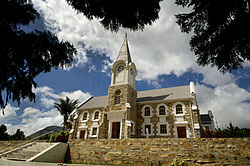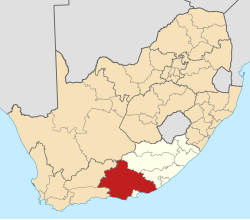Kareedouw | |
|---|---|
 Nederduits Gereformeerde Kerk church in Kareedouw | |
| Coordinates: 33°57′7″S24°17′22″E / 33.95194°S 24.28944°E | |
| Country | South Africa |
| Province | Eastern Cape |
| District | Sarah Baartman |
| Municipality | Kou-Kamma |
| Area | |
• Total | 15.10 km2 (5.83 sq mi) |
| Population (2011) [1] | |
• Total | 4,985 |
| • Density | 330.1/km2 (855.0/sq mi) |
| Racial makeup (2011) | |
| • Black African | 32.8% |
| • Coloured | 56.5% |
| • Indian/Asian | 0.3% |
| • White | 9.5% |
| • Other | 1.0% |
| First languages (2011) | |
| • Afrikaans | 72.6% |
| • Xhosa | 22.1% |
| • English | 2.4% |
| • Other | 2.9% |
| Time zone | UTC+2 (SAST) |
| Postal code (street) | 6400 |
| PO box | 6400 |
| Area code | 042 |
Kareedouw (English: Kareedowns) is a town in the Eastern Cape province of South Africa. It is the administrative centre for the Kou-Kamma Municipality in the Sarah Baartman District of the Eastern Cape.


